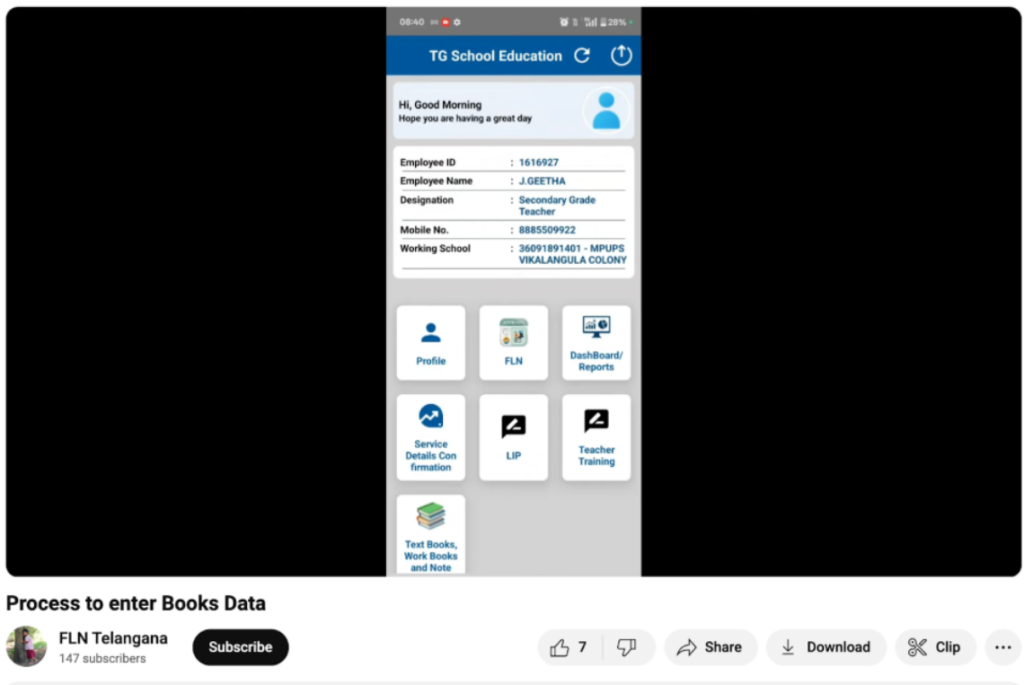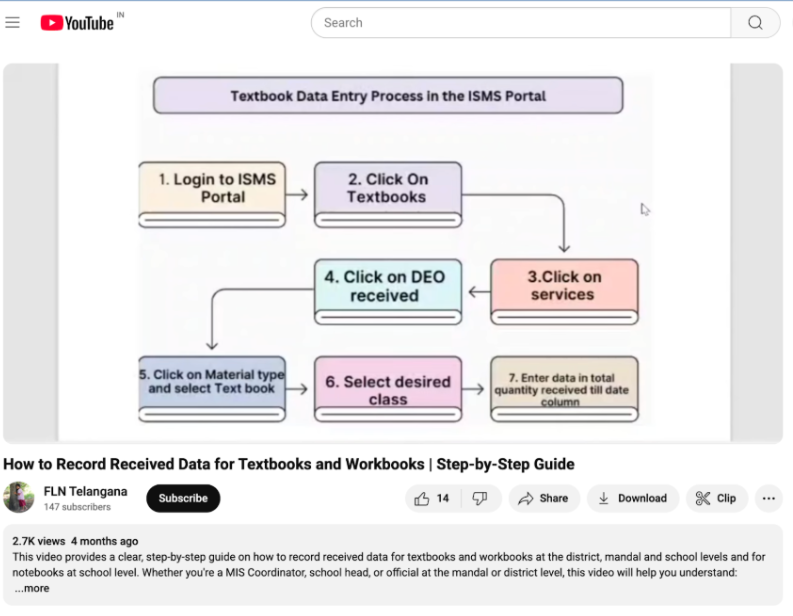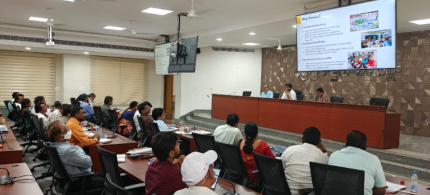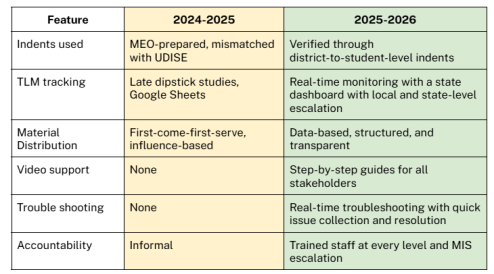 Go Back
Go BackShare
Right on Time: Bhadradri Kothagudem’s Journey to Streamlined TLM Delivery
By Karthik Rangu, Nanda Kishore Thallapally and Sai Venkat Nihith
Nov 20, 2025
In this blog, CSF’s Karthik Rangu, Sai Venkat Nihith and Nanda Kishore Thallapally document how Bhadradri Kothagudem district transformed the delivery of Teaching Learning Materials (TLMs) through data-driven planning, real-time tracking and strong governance. Their account highlights how timely access to textbooks, digital monitoring systems and coordinated field efforts can significantly strengthen classroom readiness and foundational learning outcomes across Telangana.
Over the past four years, CSF has leveraged the state’s existing Integrated School Management System (ISMS) and other digital platforms to strengthen data collection and monitoring across Telangana’s school education system. Building on the state’s strong digital foundations, CSF has supported the Department in enhancing how data is captured and used for tangible processes such as mentor school visits, and teacher training compliance to more complex areas like analysing Classroom Teaching Learning Processes (TLP) and using insights for decision-making.
One of the most persistent gaps that emerged during this work was the absence of a reliable, system-based mechanism to track the distribution of Teaching Learning Materials (TLMs), especially textbooks and workbooks. For years, this process relied on manual, paper-based records, making it difficult to verify whether schools had received the materials they needed. Stakeholders lacked visibility into shortages, surpluses, and redistribution requirements, and even review meetings did not have dependable data to assess mandal-level performance or the percentage of schools that had received TLMs.
In 2024-25, to address this long-standing challenge, the Telangana School Education Department and the State Textbook Press with support of CSF State Team introduced a comprehensive state-wide digital tracking module. This module digitises the entire lifecycle of TLMs — including dispatch from state, distribution to all levels, and school-level receipts — creating real-time visibility and significantly improving transparency across all government schools in the state. However, while the system infrastructure was in place, the state still needed stronger compliance and coordinated driving from the ground to fully realise its potential.
In 2025-26, while the digital modules for TLM tracking were in place, their uptake had to be driven ground up. CSF District Project Management Units (DPMUs) provided key field insights to further strengthen the state system and improve the uptake and usage of the dashboards. Further, districts such as Bhadradri Kothagudem deployed innovative and contextualised strategies in operationalising this state-led framework on the ground, translating digital systems and processes into timely action. This is an account of the TLM delivery journey in Bhadradri Kothagudem district.
Why Does Access to Timely Learning Materials Matter?
For a child, textbooks and workbooks are fundamental tools for learning—they are the building blocks of education. “The Annual Status of Education Reports” (ASER), over the years, have repeatedly shown that lack of basic materials (like textbooks) at the beginning of the academic year correlates with poor foundational learning outcomes. However, for many years in Telangana, students often received these essential learning materials incompletely or later than the start of the academic year, with some schools receiving books as late as August. Delayed and staggered arrival often hampered teachers to follow their lesson plans properly. This mismatch meant teachers had to teach without the right materials, leaving gaps in children’s learning.
In Bhadradri Kothagudem, the largest district in Telangana, with 956 government primary schools with 1,882 teachers serving nearly 28,000 students, the situation was no different. In the last academic year (2024–25), a dipstick study conducted by the Central Square Foundation’s District Project Management Unit (DPMU) in August revealed that only 42% of schools had received greater than 90% of their textbooks at the time of the study.
Recognising the urgent need for reform, the district education department set out to revamp the delivery mechanism in this academic year (2025–26) with a focus on timeliness, transparency and tracking.
2024-25: Embracing a New System and Addressing Gaps
In 2024–25, the state rolled out the new end-to-end digital tracking system to streamline TLM delivery up to the school level. The system allowed data entry at every level (DEO, MEO, CHM, School HM) and generated automated reports for administrators.
However, as with any new initiative, early months were spent piloting, debugging and building ground-level familiarity. Real-time troubleshooting and data entry were inconsistent across mandals. To address this, the team worked closely with the district to monitor textbook and workbook deliveries through the following actions:
- Conducted a dipstick study in 48 sample schools across the district to highlight gaps in TLM delivery
- Rolled out Google Sheets at the school level to understand differences in school demand and books delivered
- Built online dashboards to facilitate book redistribution across 82 school clusters, by visualising the actual status of TLM delivery at the school level.
The catch, however, was that these efforts were done between November and December by the district teams, by which time the academic year was already underway. Adding to the challenge, the indents (book requests) prepared by Mandal Education Officers (MEOs) were delayed and often did not align with actual student enrollment, which led to the extensive retribution exercise last year. To make matters worse, book distribution typically followed a first-come-first-serve model, leading to certain schools collecting more books than needed and resulting in significant misallocation.
The Systemic Overhaul of 2025–26: Tracing Shifts that Shaped Change
This (2025-26) academic year, the CSF team in Bhadradri Kothagudem worked proactively with the District Education Officer (DEO) office to introduce systemic improvements. This was complemented with CSF’s state team’s early efforts to further strengthen the tracking system with state officials to better reflect and accommodate ground realities. The district team effectively used this state-developed multi-level, data-driven tracking system from district to student level. The following key initiatives and practices were introduced in Bhadradri Kothagudem by the CSF district team:
- Timely Planning and Indent Correction
- District-level book requirements were cross-verified with the state indent using January and April 2025 UDISE data.
- Mandal-level indents were generated to match actual student enrollment.
- School-level indents were prepared to ensure precision and avoid uneven distribution.

“This year, we focused on distributing based on updated enrollment data, not requests. Every school received exactly what it needed—nothing more, nothing less.” – Ravi Pratap, District Warehouse Manager, Bhadradri Kothagudem, Telangana
- Training and Video-Based Support
- The CSF team identified that many stakeholders were unfamiliar with the interface of the tracking system. The team created Instructional videos to guide book data entry into the Integrated School Management System (ISMS) at every level.
- A district-wide orientation was conducted for MEOs, Complex Head Masters (CHMs), and MIS coordinators to explain the new process through live demos and practice sessions.
- Another set of videos demonstrated how teachers could enter ‘books received by students’ into the Telangana School Education App.
- Both these videos were widely circulated in mentor and teacher WhatsApp groups and reinforced during orientation sessions


- Real-time Tracking and Transparency
- Book tracking dashboards were built from district to student level, with data continuously updated in the state dashboard (ISMS).
- On a biweekly basis, the CSF team would share TLM data entry status at the district and mandal levels with the DEO to highlight bottlenecks in delivery, drive regular data updation and follow up with mandals that need support.
- In this process, the CSF team identified tech issues as a recurring challenge and created a troubleshooting Google Sheet, which was circulated for MIS coordinators to log and collate all technical issues, data entry errors and book shortages to be addressed in real time. The CSF team enabled the timely redressal of these issues in coordination with the DEO and state team.
- Reviews and Governance Support
- TLM delivery was a key component of the monthly State and District Review Meeting, chaired by the Secretary, School Education at State and District Collector at District; biweekly review meetings were also chaired by the District Education Officer at district to monitor the distribution process and the status of books at the school level.
- A dedicated district official was trained to support data entry and troubleshoot technical issues.
- The district warehouse manager received training on stock entry and analysis to improve warehouse management.
- The district team’s efforts also brought timely TLM delivery to the attention of the District Collector, who, during reviews, addressed administrative gaps such as enhancing transportation budgets for larger mandals where schools are widely scattered

Impact Generated
In the last academic year (2024-25), only 42% of schools had received over 90% of their books by August 2024. In the current academic year (2025-26), over 90% schools received textbooks and workbooks by July 2025, even before the schools re-opened in June 2025, as per the ISMS State Dashboard.
“This is the first time in years that we started the academic year with full sets of books. It made a huge difference in lesson planning and student engagement.” – Jyothi Rani, Headmistress, MPPS Palakoyya Thanda, Palvancha Mandal, Bhadradri Kothagudem, Telangana
Turning Insight into Impact: What Made the Difference
The streamlined TLM delivery in Bhadradri Kothagudem is the result of several well-aligned efforts and initiatives working together. These include:

Bhadradri Kothagudem DPMU: Charting the Way Forward with a Culture of Readiness
This year’s success is not just about books, it reflects a shift toward planning, ownership and accountability at every level of the system. From warehouse to classroom, Bhadradri Kothagudem has shown what’s possible when data meets intent.
The team takes this as a learning and reflection as it closely works with the District administration on other pillars for advancing FLN outcomes in the district.
Keywords
Authored by
Karthik Rangu
Project Manager , Strategic Support States - Telangana, Central Square Foundation
Nanda Kishore Thallapally
Project Lead , Strategic Support States - Telangana, Central Square Foundation
Sai Venkat Nihith
Project Manager, Strategic Support States, Telangana, Central Square Foundation
Share this on
